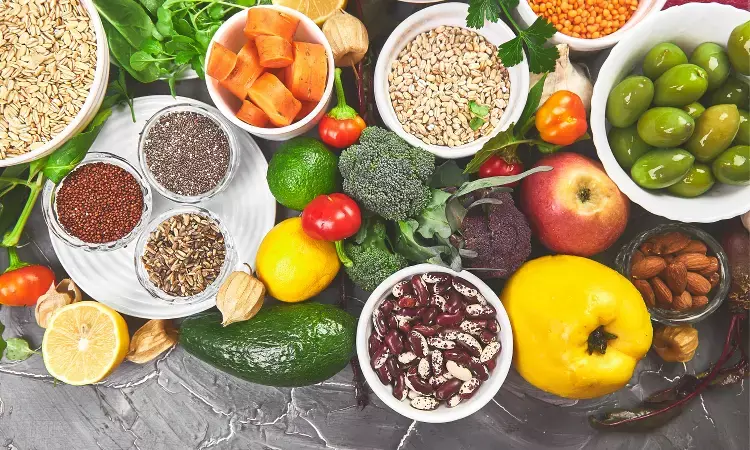- Home
- Medical news & Guidelines
- Anesthesiology
- Cardiology and CTVS
- Critical Care
- Dentistry
- Dermatology
- Diabetes and Endocrinology
- ENT
- Gastroenterology
- Medicine
- Nephrology
- Neurology
- Obstretics-Gynaecology
- Oncology
- Ophthalmology
- Orthopaedics
- Pediatrics-Neonatology
- Psychiatry
- Pulmonology
- Radiology
- Surgery
- Urology
- Laboratory Medicine
- Diet
- Nursing
- Paramedical
- Physiotherapy
- Health news
- Fact Check
- Bone Health Fact Check
- Brain Health Fact Check
- Cancer Related Fact Check
- Child Care Fact Check
- Dental and oral health fact check
- Diabetes and metabolic health fact check
- Diet and Nutrition Fact Check
- Eye and ENT Care Fact Check
- Fitness fact check
- Gut health fact check
- Heart health fact check
- Kidney health fact check
- Medical education fact check
- Men's health fact check
- Respiratory fact check
- Skin and hair care fact check
- Vaccine and Immunization fact check
- Women's health fact check
- AYUSH
- State News
- Andaman and Nicobar Islands
- Andhra Pradesh
- Arunachal Pradesh
- Assam
- Bihar
- Chandigarh
- Chattisgarh
- Dadra and Nagar Haveli
- Daman and Diu
- Delhi
- Goa
- Gujarat
- Haryana
- Himachal Pradesh
- Jammu & Kashmir
- Jharkhand
- Karnataka
- Kerala
- Ladakh
- Lakshadweep
- Madhya Pradesh
- Maharashtra
- Manipur
- Meghalaya
- Mizoram
- Nagaland
- Odisha
- Puducherry
- Punjab
- Rajasthan
- Sikkim
- Tamil Nadu
- Telangana
- Tripura
- Uttar Pradesh
- Uttrakhand
- West Bengal
- Medical Education
- Industry
Vegan diet rich in legumes beneficial for decreased weight in new study

WASHINGTON, D.C: vegan diet improves diet quality, leading to decreased weight and improved insulin sensitivity, according to a new study by the Physicians Committee for Responsible Medicine published in the Journal of the Academy of Nutrition and Dietetics. Decreased weight was most associated with increased intake of legumes and decreased intake of meat, fish, and poultry.
"Our research shows that the best way to improve the quality of your health is to improve the quality of the foods you eat," says Hana Kahleova, MD, PhD, director of clinical research at the Physicians Committee and a study co-author. "That means avoiding animal products and eating a vegan diet rich in fruits, vegetables, grains, and beans."
The participants in the 16-week study included 244 overweight adults who were randomly assigned to either make no diet changes or to follow a low-fat vegan diet, without calorie restrictions, consisting of vegetables, grains, legumes, and fruits. Researchers tracked diet quality, body weight, fat mass, and insulin sensitivity. The final data analysis included 219 participants who completed the whole study and submitted their final diet records.
Participants on the vegan diet lost an average of 13 pounds and 9.1 pounds of fat mass. Body weight and fat mass did not decrease in the group that made no diet changes. In the vegan group, increases in fruit, legume, meat alternative, and whole grain intake and decreases in animal products, added oils, and animal fats were associated with weight loss:
- Fruit: Increased intake of whole fruit was associated with a decrease in body weight.
- Legumes and Meat Alternatives: Increased legume consumption was associated with decreased weight, fat mass, and visceral adipose tissue. Consuming more meat alternatives, including tofu, tempeh, and veggie burgers, was associated with a decrease in body weight.
- Grains: Increased consumption of whole grains was associated with decreased body weight and fat mass.
- Eggs and Dairy Products: Decreased egg intake was correlated with decreased weight. Decreased high-fat dairy intake was associated with decreased weight and fat mass.
- Meat, Fish, and Poultry: Reductions in the combined intake of total meat, fish, and poultry were associated with weight loss and a decrease in fat mass.
- Added Fats: Decreases in intake of added animal fats were associated with decreases in weight and fat mass. Decreased intake of added oils also correlated with decreases in weight and fat mass.
The vegan group also experienced improvements in insulin sensitivity.
The vegan group's diet quality, measured by the Alternative Healthy Eating Index-2010 (AHEI) score, also increased by 6 points on average in contrast to no significant change in the group that did not make a diet change. The AHEI was developed by researchers at the Harvard School of Public Health to identify dietary patterns associated with lower risk of chronic disease. The index is comprised of foods to eat more often, such as fruits and vegetables, and those to eat less often, such as red and processed meat. The higher the AHEI score, the lower the risk for chronic disease.
Read the full article at;
Dr Kamal Kant Kohli-MBBS, DTCD- a chest specialist with more than 30 years of practice and a flair for writing clinical articles, Dr Kamal Kant Kohli joined Medical Dialogues as a Chief Editor of Medical News. Besides writing articles, as an editor, he proofreads and verifies all the medical content published on Medical Dialogues including those coming from journals, studies,medical conferences,guidelines etc. Email: drkohli@medicaldialogues.in. Contact no. 011-43720751


